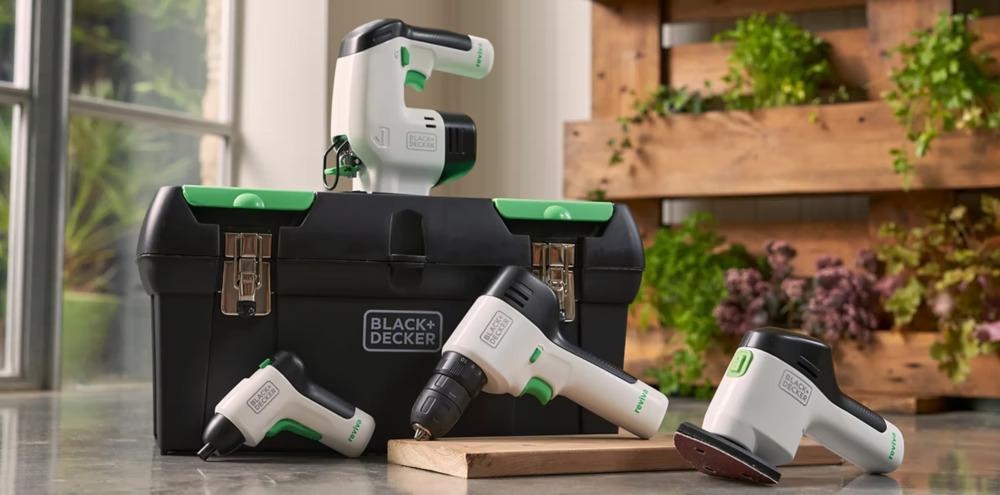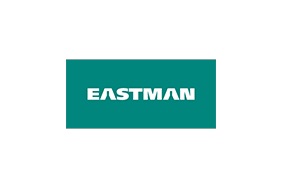BLACK+DECKER reviva™ — Bringing Sustainability to Home Products
Sustainable innovation with recycled material pays off with younger generation
Published 04-09-24
Submitted by Eastman

Stanley Black & Decker is well-known and respected in the tool market, but the 100-year-old BLACK+DECKER brand needed to build awareness with younger, sustainably minded, do-it-yourself consumers.
At the same time, the company’s chief executive officer was driving every area of the business to improve its sustainability credibility. By chance, a company representative connected with Eastman at a conference and learned about Tritan™ Renew copolyester, a safe, tough, durable material made with 50% certified recycled content.*
Dan Fitzgerald, Stanley Black & Decker’s senior director of product sustainability, knew the biggest impact on the company’s carbon footprint was the materials that go into making finished products.
“Historically, recycled content was looked down upon as being lower quality or having inferior performance as well as being inconsistent from lot to lot,” Fitzgerald said. “A power tool is a high-performance machine but made to fit into your hand. They are designed to deliver significant output torque in the case of drills and efficient, quality results in the case of a sander. These tools crank out considerable amounts of work and draw enough current to act as an ignition source for fire, which is why the materials need to be flame rated for safe use.”
The company needed materials that were going to be durable in a power tool housing but also consistent in quality and color to perfectly match the brand colors.
Tritan Renew could meet all those needs along with the specifications of the power tool housing, which led to the idea of a new product line aimed at a younger generation of do-it-yourselfers.
That didn’t make the decision to move forward easy.
Creating a new conversation on sustainability
“This project was initially met with some scrutiny,” said Ed Higgins, the company’s product director for power tools. “Most of our end users are requesting products that are louder, faster, bigger and stronger. A lot of the conversation was about the need to have sustainably minded material that wouldn’t compromise durability and strength.”
A big help was an Eastman video showing a tumbler made with Tritan holding up after a full-size pickup truck ran over it. Another key factor was the consumer insights provided by the Eastman team to guide BLACK+DECKER’s product strategy.
Consumers have grown to expect sustainable products in industries like fashion, cosmetics, and food and beverage. And now those expectations have expanded to products like paint, furniture, automotive and power tools.
The bottom line?
“If you’re in a space where there is no sustainability leader, by being first, you take a risk, but there’s also a lot of reward,” said Justin Coates, Eastman’s global consumer insights & research team leader. “You get the first-mover advantage. You position yourself as a sustainability leader and can command price premiums.”
Coates also stressed that consumers across markets and regions consider materials to be the No. 1 definition of sustainability, though brands must stress their products won’t compromise performance and quality. Brands also need to make waste reduction tangible to consumers. With Tritan Renew, BLACK+DECKER recognized that all these objectives were possible.
The decision was made to do something truly revolutionary for the broader company and market.
BLACK+DECKER reviva™
In 2021, BLACK+DECKER, a Stanley Black & Decker brand, released a completely new power tool line, reviva™, rooted in the concept of designing for circularity and ushering in a new wave of product innovation. Reviva means “new life” in Latin. The tools are striking in black and white with green highlights, providing a fresh and vibrant new look and feel to differentiate the brand. Ten reviva products launched globally in 2022, including a 12-volt drill, jigsaw and sander. Additional products will be available in 2024 with the introduction of a reviva stick vacuum and a range of cordless drills.
“We’re very proud of the story we have to tell,” Higgins said. “With Tritan Renew, we’re able to make the product sustainability aspect very tangible for consumers. For each cordless drill, we’re recycling the equivalent of eight single-use plastic bottles that might otherwise end up in landfills or incinerated. The sander uses the equivalent of 11 bottles, and our jigsaw uses the equivalent of 18 bottles.”**
The global pandemic resulted in a digital retailer sell-in launch for the European market in September 2021, and products started hitting store shelves in New Zealand in April 2022. While sales are still building, the buzz was immediate.
"The reaction and engagement surrounding reviva was strong on social as well as with retail partners, " Higgins said. "Introducing a sustainable product line has been a historic moment for the BLACK+DECKER brand."
*Recycled content is certified using ISCC mass balance allocation.
** Contain an amount of recycled material equivalent to the weight of 8, 11 and 18 0.5-L (10.3-g) single-use plastic bottles, respectively

Eastman
Eastman
Founded in 1920, Eastman is a global specialty materials company that produces a broad range of products found in items people use every day. With the purpose of enhancing the quality of life in a material way, Eastman works with customers to deliver innovative products and solutions while maintaining a commitment to safety and sustainability. The company’s innovation-driven growth model takes advantage of world-class technology platforms, deep customer engagement, and differentiated application development to grow its leading positions in attractive end markets such as transportation, building and construction, and consumables. As a globally inclusive and diverse company, Eastman employs approximately 14,000 people around the world and serves customers in more than 100 countries. The company had 2023 revenue of approximately $9.2 billion and is headquartered in Kingsport, Tennessee, USA.
About Eastman in the circular economy: In 2019, Eastman became the first company to begin commercial-scale chemical recycling for a broad set of waste plastics that would otherwise be landfilled or, worse, wind up in the environment. Eastman's molecular recycling technologies can process waste plastics traditional mechanical recycling methods cannot—including polyesters, polypropylene, polyethylene, and polystyrene—derived from a variety of sources, including single-use plastics, textiles, and carpet. These technologies provide a true circular solution of endless recycling for materials, allowing them to be reused repeatedly.
To learn more about how we’re working to make a more circular economy visit eastman.eco.
More from Eastman

